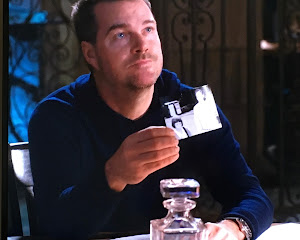"Fukushu" (Season 13, Episode 2)
Television dramas and sitcoms often address current social issues, and some of the efforts result in powerful episodes. But not every effort is successful, and whether the effort is successful or not depends on the writing. This episode of NCIS:LA focused on a current social issue--hate crimes against Asian Americans--and was successful in some areas but not in others. The episode revolved around the beating of a 73 year-old Vietnam veteran, Lt. Junior Grade Craig Tanaka, a former Marine, by two masked men in a beach parking lot at dusk. This initial beating was difficult to watch because of its violence and the all-to-real stories of such attacks that have taken place. It would have been an outstanding episode if the rest of the episode had maintained the same intensity as the opening scene. Unfortunately, it didn't.
The
opening gym sequence gave Deeks an opportunity to show off his arms, Kensi
an opportunity to demonstrate her fitness level, Sam an opportunity to
demonstrate his strength (accompanied by an "age" comment from Deeks),
and Rountree a chance to wear workout clothes. Callen and Fatima were noticeably absent. Their workout was interrupted by Kilbride who
informed them they had a new case and handed out the assignments: Sam and Fatima
were to meet Tanaka's son at the boatshed while Kensi and Deeks were to go to
the crime scene and Rountree was to join Kilbride in Ops. That Kilbride would request--and be granted permission--for NCIS to investigate this crime was plausible, as long as LAPD ceded their right to handle the investigation since it was a civilian case not involving any active member of the military or a national security issue. But because one of their detectives, Jack Tanaka, was also the victim's son, it's possible LAPD brass felt it prudent to leave this investigation to a neutral law enforcement agency. So, OSP took it on. (I did wonder when Rountree became familiar enough with technology to work in Ops, but since he didn't actually do much more than wear an earpiece and look at the screen, it didn't matter much.)
From this opening, the writing, while earnest, worked in some areas and had problems in others. What worked were some of the conversations. The conversation between Sam and Fatima was good and Sam's attitude, a far cry from the way he reacted and behaved when Kam was the victim of a kidnapping, was calm and professional. It was nice to see the thoughtfulness in his conversation with Fatima contrasting with her anger. In the conversation between Kilbride and Rountree it was nice to see the non-sarcastic side of Kilbride emerge, and the personal explanation of why he wanted OSP on the case provided a glimpse into his own past. I would have liked to hear Rountree share a personal experience of dealing with racism, and I wondered if Harimoto set Kilbride's youth in Oregon because of that state's very racist history.
One of the main problems with the episode was also the conversations because there were a lot of them and not a lot of action. A secondary problem was that much of the outrage expressed in these conversations was done by white men, people who've experienced the least amount of discrimination because of either race or gender. I understood Kilbride's story was personal, and I get that Deeks is a "sensitive" guy and a champion of the oppressed, but to have the straight white guys given major scenes to express their outrage over a racial incident was awkward. Also, anyone who's traveled America and looked at it objectively knows that racism exists--today and throughout America's history--so Deeks' comment reflected more the promise that is America than the reality. Obviously, not everyone in America is racist and America has taken steps forward, but the promise that is America has a long way to go before it's fulfilled for everyone.
The later conversation between Kensi and Deeks about interracial adoption was interesting and one that any couple considering adoption should have, but it was a conversation that was specific to them and not specifically related to the Asian American community. Honestly, it would be a nice change of pace to hear Kensi and Deeks discuss something other than babies, trying to get pregnant, and adoption: in-laws, fixing up the yard, planning a vacation, getting ready for the holidays, or even getting a pet are all subjects they might discuss.
The conversations between Fatima and Rountree were good. The characters are beginning to develop their personalities and a rapport with one another. (One of my personal quirks is I like it when a character doesn't have too much in common with the actor portraying him/her because the character can morph into the actor. I like that Callen doesn't play golf and that Sam doesn't rap on the side. In this case, I was a little disappointed to hear Rountree talk about playing ball since Caleb actually played football for Alabama.)
The way the attackers were eventually discovered was nothing special--a spray can thrown away and a fingerprint recovered--but one thing about the episode that really didn't work for me were the actions of Tanaka's son. While his final speech beside his father's hospital bed was powerful, I don't think it validated what he did nor is vigilantism or brutality by law enforcement a particularly positive message, especially today. This same justification happened in "The Frogman's Daughter" when Sam beat up one of the men who'd kidnapped Kam until Callen stopped him, and in this episode Tanaka's son kidnapped and beat the men who'd beaten his father. While Sam suffered no consequence for his behavior, Tanaka's son threw away his career for a few minutes of satisfaction getting revenge on his father's attackers. And his reasoning was ridiculous: the video he made of the beating he gave the men would serve as a deterrent to others. Seriously? There were so many other ways he could have handled this situation and made a forceful statement other than breaking the law, getting arrested himself, and throwing away his career. Of course he was angry, but there was always the chance, even though slim, that he'd kidnapped and beaten the wrong men. If the men and women hired to enforce the law abandon it when they feel it's justified, why should "ordinary" citizens not do the same or why should they trust the members of law enforcement? Just as America should be "better than this," those sworn to uphold the law should be "better than this."
The other major problem with this episode was that the attack on Tanaka might not have even
been a "hate" crime by definition. It turned out that Benjamin and Billy Strauss, the
father and son who attacked Tanaka, had owned the restaurant he was renovating. They were
upset about losing their restaurant and may have attacked Tanaka
because they thought he was the new owner.
That doesn't mean that they didn't attack him because he
was Asian American; however, there was no indication that these two attacked Asian Americans in the community in random violent acts perpetrated by feelings of racism. Providing the
perpetrators of the crime with an economic reason muddies the water, and if a hate crime is the focus of the episode,
that probably isn't what you want to do as the writer.
One thing I missed was any interaction between the team and the large and diverse Asian American community. Where
was the outreach to the leaders in this community for help with this
case or for leads? Where were those in the community angry and demanding
justice? Did no one in this community think of fighting back? This community--like every community--includes those who'd have no problem working outside the law. That dynamic could have created more intensity in the episode by contrasting the desire for revenge with the search for justice.
I was also confused about the absence of Callen. The episode was almost halfway over before Callen finally made an appearance, and this was a problem for me for a few reasons. The first reason is that he's the only character who's been absent for half an episode on "personal" time. This happened in "Fortune Favors the Brave" and "The Frogman's Daughter." It seems Callen leaves town when the writers want to give more screen time to Fatima and Rountree. If that's the case, the writers need to start sending the other team members--Sam, Kensi, and Deeks--out of town for "personal" time, as well. And this brings me to the second reason this is a problem for me. His absences, like this one, are because he's spending time with Anna. While it's nice to hear they're still a couple, it's lazy writing and disrespectful to the characters. Anna doesn't need to be in every episode, but it makes no sense to have a couple with as many issues as these two have and not show them dealing with their problems. Anna's been an important part of Callen's life since season 7. Regardless of where this relationship goes, right now Gemmill should give these two time onscreen to work things out. Finally, sending Callen out of town on short "vacations" with his girlfriend is not dealing with the stress he's under, stress that was finally recognized by Sam in the first episode this season. All the agents feel stress, but it's obvious that Callen has accumulated a great deal of stress--physical and mental--and although he compartmentalizes it, everyone has a limit. His job is stressful, his relationship with Hetty is becoming more stressful, his personal life has been--and still is--stressful (he's still dealing with Joelle and Katya, and as far as we know, his relationship with Alex hasn't improved). And he's not one who confides in or opens up to others or who we've ever seen in a "Nate session." Plus, we have no idea about the current state of his relationship with Anna. In "Overdue," Callen decided to propose to Anna and in "A Fait Accompli" he drove hundreds of miles to do that, and then, as usual, there were complications. So, he hasn't yet. Why not? What's holding him back now? Have they even talked about getting married? We don't know, and whatever's going on is probably just adding more stress. Dealing with repeated and accumulated stress is a serious health issue and deserves to be handled with the same seriousness as racism and adoption. I hope the writers treat it as such and don't relegate it to secondary status by having Callen deal with it offscreen and unseen.
Overall, this episode was not particularly memorable and it had some serious problems, but it wasn't a total disappointment. To be honest, I expected a stronger story from Harimoto who has written some of the better episodes in seasons past, especially since the subject itself is so intense. Here's hoping next week's episode is stronger.



Comments
Post a Comment